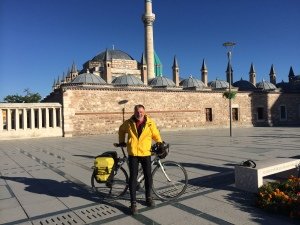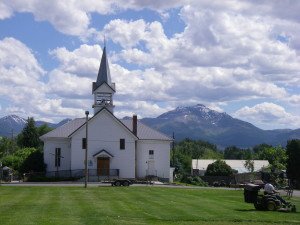Two Unlikely Lovers
I have discovered two unlikely lovers--agnostic and Christian.Eight years ago Facebook asked me to fill out my profile including age, marital status, political views and religion. Age and marital status were easy. A few key strokes and I was done. Political views took a little more time. I didn't want to just put down a specific party since my politics are much more complicated and nuanced than any one single party can represent. But after some hours of thought I was able to feel good about the phrase "politics of compassion and justice." But then came the religious question. Wow! I was completely stumped. I could quickly write in Christian as if I was checking off a box on the census. But Christian can mean just about anything. If I was going to put Christian I wanted people to know what kind of Christian I was. I didn't want people to assume I was the Jerry Falwell sort of Christian. For a time I pondered liberal progressive Christian but it wasn't satisfying. That sounded more like a political view than the soulful, sensual way I feel about my spiritual identity.I wrestled with this for six full months trying on adjectives, switching words around and pondering the complexity of my faith. Finally one day I came up with agnostic Christian mystic. It felt right. It identified me as a Christian but put my own particular brand on it. I also liked that it was complicated enough that one couldn't easily go, "Oh, he's that type of Christian" and move on. It made people think, take a second thought, and look below the surface.I could have never guessed how well this little three word descriptor would serve me. I haven't changed it now for eight years. In fact I feel like I am only beginning to understand the fullness of the words as I continue to live more deeply into a spiritual life that is marked by the open uncertainty of agnosticism, the radical values of Christianity, and the yearning for the direct experience of God as reflected in religious mysticism.
But then came the religious question. Wow! I was completely stumped. I could quickly write in Christian as if I was checking off a box on the census. But Christian can mean just about anything. If I was going to put Christian I wanted people to know what kind of Christian I was. I didn't want people to assume I was the Jerry Falwell sort of Christian. For a time I pondered liberal progressive Christian but it wasn't satisfying. That sounded more like a political view than the soulful, sensual way I feel about my spiritual identity.I wrestled with this for six full months trying on adjectives, switching words around and pondering the complexity of my faith. Finally one day I came up with agnostic Christian mystic. It felt right. It identified me as a Christian but put my own particular brand on it. I also liked that it was complicated enough that one couldn't easily go, "Oh, he's that type of Christian" and move on. It made people think, take a second thought, and look below the surface.I could have never guessed how well this little three word descriptor would serve me. I haven't changed it now for eight years. In fact I feel like I am only beginning to understand the fullness of the words as I continue to live more deeply into a spiritual life that is marked by the open uncertainty of agnosticism, the radical values of Christianity, and the yearning for the direct experience of God as reflected in religious mysticism. While I never hid my Facebook profile I also didn't advertise it. It wasn't like I wore a button that clearly flashed the words agnostic Christian mystic. Most people knew me as a Presbyterian pastor and that was probably good enough for them and for me. It wasn't until serving a church on the coast in 2013 that my little identifier was noticed when I wrote an honest, but slightly tongue-in-cheek letter to the editor describing my label. You know what four letter word hit the fan! The word agnostic was too big a pill to swallow for many in the church. I nearly lost my job and although I was retained my ministry never really fully recovered with this congregation.
While I never hid my Facebook profile I also didn't advertise it. It wasn't like I wore a button that clearly flashed the words agnostic Christian mystic. Most people knew me as a Presbyterian pastor and that was probably good enough for them and for me. It wasn't until serving a church on the coast in 2013 that my little identifier was noticed when I wrote an honest, but slightly tongue-in-cheek letter to the editor describing my label. You know what four letter word hit the fan! The word agnostic was too big a pill to swallow for many in the church. I nearly lost my job and although I was retained my ministry never really fully recovered with this congregation. But I am convinced more than ever that having a thread of agnosticism has become vitally important to my work as a minister. I am serving another congregation now in Southern Oregon. Of the six congregations I have served in my twenty-five plus years this is the most diverse. There is a fairly strong representation of members who lean awfully close to fundamentalist expressions of faith more typical of Assembly of God, Calvary Chapel, Southern Baptist, etc. There are also a handful of members who lean in the complete opposite direction and would probably fit in a Unitarian Universalist Church.I have discovered that it is the agnostic thread in my spiritual identity that allows me listen for the God presence in each person despite their very broad diversity. I am struck by the irony that the word agnostic throws so many church-going faithful. Yet it is the agnostic, I-don't-know-for-sure, still evolving part of my faith that allows me to meet with each member and discover something new and fresh about their faith and mine. I can hear the deep sincerity in the voice of the person who insists that Jesus is the only way to salvation as I can the sincerity of the person who is just as convinced that Jesus ISN'T the only to salvation.I am convinced that religious leadership in the future will require a healthy dose of agnostic sensibility. Our culture and our congregations are becoming more and more diverse. The old style of a minister who is trained to preach and teach only one very thin and specific expression of faith will not be enough. We will need to become multi-lingual and able to speak the language of Billy Graham revivalists as well as non-theistic Unitarians. Doubt will need to be honored as much a spiritual value as faith.It's a strange paradox. I would never require my parishioners to adopt an agnostic thread if it was not comfortable for them. But as a professional minister, as one who works with a wide diversity of faithful people, as one who wants to recognize God in each person it is not my certainty about faith that allows me to sit with both fundamentalists and Universalists. It's my uncertainty, my doubt and my openness that keeps me listening, growing, and wanting to share the faith of others.Eight years ago I wrestled hard with a short pithy way to capture my religious identity for Facebook. I first thought I was putting two opposites together--agnostic and Christian. Now I realize that the two are made for each other. They aren't enemies. They are lovers.
But I am convinced more than ever that having a thread of agnosticism has become vitally important to my work as a minister. I am serving another congregation now in Southern Oregon. Of the six congregations I have served in my twenty-five plus years this is the most diverse. There is a fairly strong representation of members who lean awfully close to fundamentalist expressions of faith more typical of Assembly of God, Calvary Chapel, Southern Baptist, etc. There are also a handful of members who lean in the complete opposite direction and would probably fit in a Unitarian Universalist Church.I have discovered that it is the agnostic thread in my spiritual identity that allows me listen for the God presence in each person despite their very broad diversity. I am struck by the irony that the word agnostic throws so many church-going faithful. Yet it is the agnostic, I-don't-know-for-sure, still evolving part of my faith that allows me to meet with each member and discover something new and fresh about their faith and mine. I can hear the deep sincerity in the voice of the person who insists that Jesus is the only way to salvation as I can the sincerity of the person who is just as convinced that Jesus ISN'T the only to salvation.I am convinced that religious leadership in the future will require a healthy dose of agnostic sensibility. Our culture and our congregations are becoming more and more diverse. The old style of a minister who is trained to preach and teach only one very thin and specific expression of faith will not be enough. We will need to become multi-lingual and able to speak the language of Billy Graham revivalists as well as non-theistic Unitarians. Doubt will need to be honored as much a spiritual value as faith.It's a strange paradox. I would never require my parishioners to adopt an agnostic thread if it was not comfortable for them. But as a professional minister, as one who works with a wide diversity of faithful people, as one who wants to recognize God in each person it is not my certainty about faith that allows me to sit with both fundamentalists and Universalists. It's my uncertainty, my doubt and my openness that keeps me listening, growing, and wanting to share the faith of others.Eight years ago I wrestled hard with a short pithy way to capture my religious identity for Facebook. I first thought I was putting two opposites together--agnostic and Christian. Now I realize that the two are made for each other. They aren't enemies. They are lovers.
